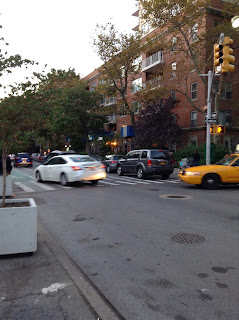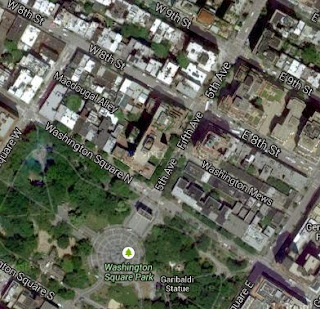Time: 10/20/2013, 4pm-6:30pm
Route: From Madison Square Park to
Washington Square Park
Transportation tool: Citi Bike
I had my second bicycle lane observation
trip on Sunday, 20th Oct. by renting Citi bike. My trip was actually
a line connected by 3 well-known nodes-- Madison Square Park, Union Square, and
Washington Square Park, totally covering 5 roads—Broadway, E17th street, Park
Ave, E14th street, and Fifth Ave. I did observations in all of the 3 nodes;
each of observations was more than 15 minutes long. During these observations
and what I saw along the route, I had many interesting discoveries.
Map
 |
Node 1-Madison Square Park:
Intersection: Broadway, Fifth Ave and E23rd
Street. (image01,02)
Observation time: 4:22-4:32pm
Since the famous Flatiron Building and
Madison Square Park are located nearby, this area has lots of pedestrians and
auto-mobile traffic, also bicyclists. The road status traffic organization of
this area is good; the reason should be the property of this zone- many
business buildings plus high-quality residential apartments. Good district always have relatively good infrastructure, including the roads.
1)
Helmets--25%
In the 10 minutes observation period, there were 5 of 20 bicyclists wearing helmets, including the freight ones. Not too bad.
2)
Traffic behavior
Drivers- very careful, barely have occupying bicycle lanes (image03)
Pedestrians- most of them obey traffic rules, using their
own passageways, also respect the bicyclists. I think the reason is because
there are lots of motor vehicles, and the traffic in this intersection seems a
little complicated.
 |
| image04- some bicyclist occupy motor lane |
Bicyclists- some of the bicyclists occupy the motor way when there are no cars when crossing the road (image04)
Signage- Good and complete
Maintenance- Perfect (image05)
Continuity- Good. Besides, there is an extension of bicycle
lane in the intersection, to make bicyclists stand in advance of drivers and feel safe when the traffic lights turn green. (image06)
lane in the intersection, to make bicyclists stand in advance of drivers and feel safe when the traffic lights turn green. (image06)
I didn’t see many problems here. Low helmets
wearing ratio could be one.
Node
2-Union Square:
Intersection: Broadway and E17th Street. (image07,08)
Observation time: 5:07-5:17pm
This is a busy intersection. The overall
traffic situation is worse than the first node. Here are larger amounts of
motor vehicles and pedestrians, also more bicyclists. Phenomenon of breaking
traffic rule seems popular. Fortunately, the helmets wearing ratio are high.
 |
| image07,08-Union Square node |
1)
Helmets--45%
In the 10 minutes observation period, there were 14 of 31
bicylists wearing helmets, including the freight ones. This is the best of the
3 nodes.
Drivers- Average level, no serious breaking rules
behaviors.
Pedestrians- Very careful because of so busy traffic!
Bicyclists- Very bad, many bicyclists just rush across the
pedestrian crossing way even there is a turning-on light for the pedestrians. (image09)
Signage- Instruction signage is ok (image10), but the
printing signage on the road is wearing out because of the traffic.
Maintenance- Below average, out of flatness.
Continuity- Good. Also there is specific turn-left lane
with instruction signage for relative bicyclists.
Major problem:
Maintenances.
Disrespect pedestrians.
Node
3-Washington Square Park:
Intersection: Washington Square N Street and
5th Street.(image11,12)
Observation time: 5:59-6:09pm
Here is a three-way intersection. The other
side is the Washington Square Park. Those people who enter or out of the
Washington Square use this intersection. The traffic here is very complicated
and there is a discontinuity in bicycle lane which leads in a disorder of
traffic organization.
1)
Helmets--31%
In the 10 minutes observation period, there were 5 of 16
bicylists wearing helmets, including the freight ones. Better than the first
one.
2)
Traffic behavior
Drivers- Actually they obey the rules very well, but they
threaten the bicyclists unconsciously, just because the bicycle lanes are
incomplete.
Pedestrians- OK, someone doesn’t use the crossing way.(image13)
Bicyclists- they ride freely and disorderly, sometime under a dangerous circumstances (image14,15)
 |
| image14- riding with the cars, dangerous |
 |
| image15- when you turn right here, it's difficult for you to ride to the green lane over the street when there is a traffic, dangerous |
3)
Infrastructures
Signage- Good
Maintenance-Good
Continuity- Bad case here.
There is a strange thing, the bicycle lane on Fifth Ave is located on the left side of road, when you need to turn right in the intersection, there is a specific crossing way for you, and this is good. But after you turn right, you need cross the E14th Street again, because this time the bicycle lane is located in the left side, when the light is green, you need finish the crossing action with the motor vehicles running close to you- you can see how dangerous it is. Another weird thing is, if you want to turn left, there is no bicycle lane for you… I think the turn-left issue is popular, but the conflict and insecurity are obviously.(image16,17,18)
There is a strange thing, the bicycle lane on Fifth Ave is located on the left side of road, when you need to turn right in the intersection, there is a specific crossing way for you, and this is good. But after you turn right, you need cross the E14th Street again, because this time the bicycle lane is located in the left side, when the light is green, you need finish the crossing action with the motor vehicles running close to you- you can see how dangerous it is. Another weird thing is, if you want to turn left, there is no bicycle lane for you… I think the turn-left issue is popular, but the conflict and insecurity are obviously.(image16,17,18)
 |
| image16: two directions of the same road, one with bicycle lane, another not |
 |
| image17- towards west, green lane |
 |
| image18-toward east, no lane |
Major
problem:
Discontinuity.
Over bravery of the bicyclists.
Road
1- Broadway between 22nd Street and 23rd Street
Good maintenances and complete signage. Extension
of bicycle lane in the intersection. Good share with roller skater (image19)
Road 2- Broadway between 21nd Street and 22rd Street
Nice combination with Citi bike station,
and parking lots. Increased safety.(image20)
 |
| image20- good combination with station, parking lots |
Road 3- University Pl Street and E13th Street
Discontinuity. There is a Citi bike station
on the University Pl Street, people use to rent a bicycle here and ride towards
south and turn left, right or go straight down at the intersection of the two
roads. However, there is only one bicycle lane besides the Citi bike station and
ends at the intersection. There are no any bicycle lanes in other three directions. This can easily make the bicyclists confused here and
lack of sense of safety.(image21,22)
 |
image21- here is a citi bike station
|
 |
| image22- bicyclists from different directions ride without their own lanes |
My Conclusions:
Physical
aspect
1)
Land use -- road
Jane Jacobs said in her book that the
property of surrounding zone and who live there decide the park is good or bad,
not the reverse. Road is the same. Bicycle lane is one part of urban roads. In good
zone, there are always bicycle lanes in good maintenances, while in the poor or
messy area, like Chinatown, the bicycle lanes and cycling environment are in bad
situation. We need research the surrounding plots to decide the improvement
construction of bicycle lane
Social
behavior aspect
1)
Infrastructure maintenance –
driver behavior
I found that the better the lane maintenance, the more politely
the vehicle driver behavior is, and vice versa. Like the Madison Square
intersection has better bicyclist’s behavior than the Union Square intersection.
I think this is because of the positive impacts of good quality of urban
infrastructure.
.
2)
Quantities of bicyclists- obey
rule or not
When there is a good pedestrian park with certain
proportion residential area located nearby, like the Washington Square area,
the bicyclists become more bravery, with more breaking rule’s behaviors. If the
sense of that”there is a walkable and peaceful area nearby” encourage the
freedom and courage of the bicyclists? Bicyclists, well as pedestrians, are disadvantaged
groups in the urban transportation. In society, while the group is larger, it
seems to be stronger. So is the bicyclists group, just a point of view.












No comments:
Post a Comment